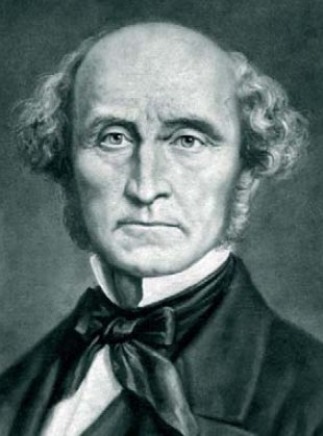Utilitarianism

John Stuart Mill was born on the 20th May 1806 in the Pentonville area of London. He was the eldest son of James Mill, a Scottish philosopher and historian. He was given an extremely rigorous upbringing; he was even shielded from association with children of his own age other than his siblings. He was a British philosopher, political economist, civil servant and a Member of Parliament. In his life, he created the theory of Utilitarianism. He eventually died on the 8th May 1873 in Avignon, France.
The origins of Utilitarianism are often traced back as far as the Greek philosopher Epicurus, but it is generally credited to Jeremy Bentham. Bentham found pain and pleasure to be the only intrinsic values in the world: "nature has placed mankind under the governance of two sovereign masters, pain and pleasure." From this he derived the rule of utility, that something is considered good if it brings the greatest happiness to the greatest number of people. Later, after realizing that the formulation recognized two different and potentially conflicting principles, he dropped the second part and talked simply about "the greatest happiness principle."
However, although Jeremy Bentham is thought by most to have discovered the theory of Utilitarianism, John Stuart Mill is the actual founder. Mill claims that he "did not invent the word, but found it in one of John Galt's novels, the 'Annals of the Parish,' in which the Scottish clergyman, of whom the book is a supposed autobiography, is represented as warning his parishioners not to leave the Gospel and become utilitarians. With a boy's fondness for a name and a banner I seized upon the word..." Mill subsequently named his society of like-minded thinkers the "Utilitarian Society", which met for three and a half years.
In his famous short work, Utilitarianism, John Stuart Mill argued that cultural, intellectual, and spiritual pleasures are of greater value than mere physical pleasure, because the former would be valued more highly by competent judges than the latter. A competent judge, according to Mill, is anyone who has experienced both the lower pleasures and the higher. Like Bentham's formulation, Mill's utilitarianism deals with pleasure or happiness.
Utilitarianism means that as long as majority of the people benefit from an action, whether financially or through sheer happiness, that action is deemed correct, however wrong it might seem. Utilitarianism can be characterized as a quantitative and reductionist approach to ethics. It is a form of consequentialism which is that the moral worth of an action is determined by its outcome. Through this, we know that the greatest good for the greatest number of people is the best action. It basically means that before you carry out an action, you see if the amount of people that benefit from that action is greater than the amount of people that get losses from the action. If the people who benefit are more than those who do not benefit and the overall happiness of the world will become higher, then that action is correct.
For example, if you intend to murder someone, consider the consequences. Perhaps you might benefit by + (positive) 200 points. But the victim’s family will feel extremely sad which might be equal to – (negative) 10 000 points. The overall happiness will decrease by 9800 points. Since the overall happiness decreases, that action is wrong. If the overall happiness increases, according to utilitarianism, murdering that person is right.
Let us look at how utilitarianism can be applied to what goes on in our daily lives. You are in school and your friend Mary has got a packet of candy which you really want. You will be tempted to steal Mary's candy when she is not looking. If you stole the packet of sweets, your happiness would be about + 200 points but Mary's happiness would be about - 300 points. You must consider everyone's happiness equally, so clearly you should not steal the candy, because it decreases the overall happiness by 100 points.
Utilitarianism has been used as an argument for many different political views. In his essay ‘On Liberty’ and in some of his other works, John Stuart Mill argued that utilitarianism requires that political arrangements satisfy the “liberty principle” or “harm principle”, according to which “the only purpose for which power can be rightfully exercised over any member of a civilized community, against his will, is to prevent harm to others.” Prevention of self-harm by other persons was considered expressly forbidden, although Mill states that potential self-harm is a reason for other persons to try to persuade a person not to do something.
Utilitarianism is a good thing in our society as it causes people to think of the consequences of their actions before they carry out those actions. The argument statement “Law contradicts Utilitarianism” is such because the law might say “Do not steal”. But if stealing something benefits majority of the people, then we should do it. This shows that we should follow utilitarianism rather than law if it is for the well being of majority of the people.
